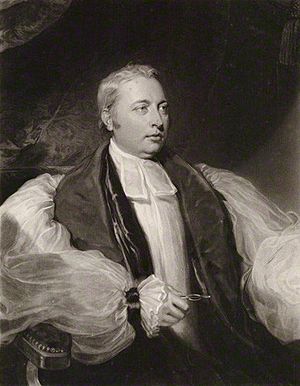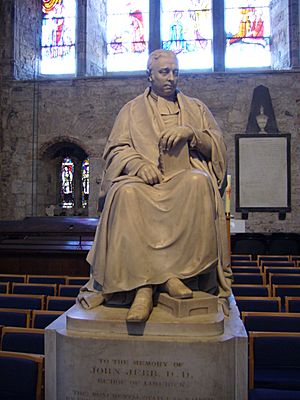John Jebb (bishop) facts for kids
John Jebb (born September 7, 1775 – died December 9, 1833) was an important Irish churchman and writer. He became a bishop and was known for his strong beliefs and friendly nature. He also wrote many books about religion.
Contents
His Life Story
John Jebb was born in Drogheda, Ireland. He was the younger son of John Jebb senior, who was an alderman (a local town leader) in Drogheda. His family had land in County Kildare. John's grandfather, Richard Jebb, came to Ireland from England.
Early Education and Friendships
John went to school in Celbridge and then to the Free Grammar School in Derry. There, he became lifelong friends with a theologian (someone who studies religion) named Alexander Knox. After that, he studied at Trinity College Dublin.
Becoming a Churchman
In 1799, John Jebb became a priest. He worked as a curate (an assistant priest) in Swanlinbar, County Cavan. Later, he moved to Mogorbane in County Tipperary. In 1805, he became a private chaplain (a religious advisor) to Charles Brodrick, who was the Archbishop of Cashel.
In 1809, he became the rector (the main priest) of Abingdon in County Limerick. His good friend, Charles Forster, worked as his curate there. John also spent time in England, where he became friends with important people like William Wilberforce and Hannah More.
Challenges and New Roles
In 1812, John was badly hurt in a carriage accident. His health was never quite the same after that.
In 1821, he became the archdeacon of Emly. This is a senior church official who helps the bishop. The next year, in 1822, there was a famine (a time when there isn't enough food) in western Ireland. John helped keep order in the Emly area during these difficult times. Because of his good work, he was made Bishop of Limerick, Ardfert and Aghadoe that same year.
As a Bishop
As a bishop, John Jebb worked to make sure that people training to be priests had a very good education. He believed that future priests should be excellent scholars. He often said that candidates might trick him about how religious they were, but not about how much they knew!
In 1827, he had a stroke, which made it hard for him to move around. After this, he spent his time in England, focusing on his writing. He is best remembered for his letters with his friend Alexander Knox. John Jebb believed in a "High Church" approach to religious practices. This means he liked more traditional rituals and ceremonies in church. Some people see him as someone who helped start the Oxford Movement, which was a religious movement in England.
John Jebb never married. He passed away in East Hill, near Wandsworth, England. People remembered him as a very learned man with strong beliefs and a kind heart. His close friend, Charles Forster, wrote a book about his life in 1836.
His Family
John Jebb's older brother was Richard Jebb. Richard was a judge in Ireland, and the two brothers cared for each other very much. Richard's son, also named John Jebb, later became a canon (a type of priest) at Hereford Cathedral in England.
His Character
Bishop Jebb was known for being very generous, honest, and fair. He was modest and a bit shy, but he also had a great sense of humor.
His Writings
John Jebb wrote several important books and collections of letters:
- Sermons (London, 1815) - These were collections of his religious talks.
- Sacred Literature (1820) - A book about religious writings.
- Practical Theology (2 volumes, 1830) - Books about how religious ideas apply to everyday life.
- Biographical Memoir of William Phelan (1832) - A short biography of another person.
- His letters with Alexander Knox were put into a book by C. Forster (2 volumes, 1834).
- Piety without asceticism, or, The Protestant Kempis (1846) - A book about living a religious life without being too strict.



